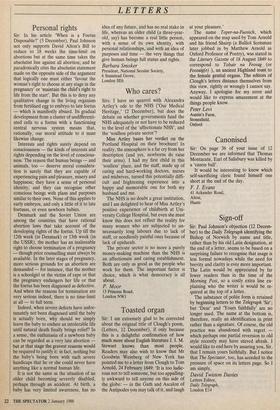LETTERS
Personal rights
Sir: In his article 'When is a Foetus Disposable?' (5 December), Paul Johnson not only supports David Alton's Bill to reduce to 18 weeks the time-limit on abortions but at the same time takes the absolutist line against all abortion; and he paradoxically cites the absolutist statement made on the opposite side of the argument that logically one must either 'favour the woman's right to choose at any stage in the pregnancy' or 'maintain the child's right to life from the start'. But this is to deny any qualitative change in the living organism from fertilised egg to embryo to late foetus — which is manifestly absurd. Its gradual development from a cluster of undifferenti- ated cells to a foetus with a functioning central nervous system means that, rationally, our moral attitude to it must likewise change.
Interests and rights surely depend on consciousness — the kinds of interests and rights depending on the level of conscious- ness. The reason that human beings — and animals, too — deserve moral considera- tion is surely that they are capable of experiencing pain and pleasure, misery and happiness; they have a sense of personal identity; and they can recognise other conscious beings with plans and purposes similar to their own. None of this applies to early embryos, and only a little of it to late foetuses, or even newborn babies.
Denmark and the Soviet Union are among the countries that have rational abortion laws that take account of the developing rights of the foetus. Up till the 12th week (in Denmark) or 13th week (in the USSR), the mother has an inalienable right to choose termination of a pregnancy — though prior counselling must always be available. In the later stages of pregnancy, more serious grounds for an abortion are demanded — for instance, that the mother is a schoolgirl or the victim of rape or that the pregnancy endangers her life or that the foetus has been diagnosed as defective. And when the reasons for termination are very serious indeed, there is no time-limit at all — to full term.
Indeed, when severe defects have unfor- tunately not been diagnosed until the baby is actually born, why should we simply leave the baby to endure an intolerable life until natural death finally brings relief? In a sense, the euthanasia of a newborn baby can be regarded as a very late abortion but at that stage the gravest reasons would be required to justify it: in fact, nothing but the baby's being born with such severe handicaps that he or she could never have anything like a normal human life.
It is not the same as the situation of an older child becoming severely disabled, perhaps through an accident. At birth, a baby has very limited awareness, has no idea of any future, and has no real stake in life, whereas an older child (a three-year- old, say) has become a real little person, with a sense of its own identity, with personal relationships, and with an idea of purposes and time — the very things that give human beings full status and rights.
Barbara Smoker
President, National Secular Society, 6 Stanstead Grove, London SE6










































 Previous page
Previous page